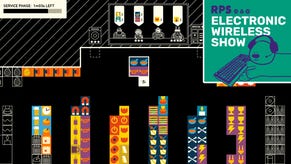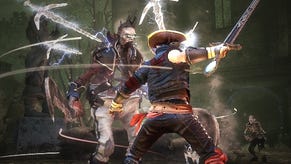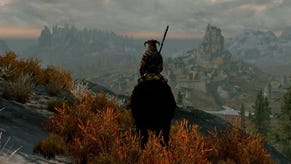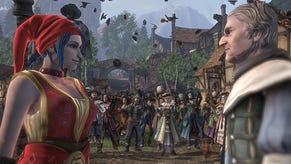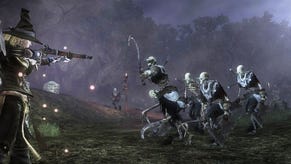Interview: Lionhead on Fable III, PC and GFWL
Hello! So, when I pottered off to Lionhead to take a peek at the upcoming PC version of Fable III, I also had a chat with lead designer Josh Atkins. Read on for how the studio feels about PC gaming and PC gamers, the choices, changes and improvements they made for the PC version of Fable III, how youngsters react to difficult moral decisions in games, and the thorny issue of Games For Windows Live...
RPS: Why did you decide to make a PC version of Fable III, given you didn’t for Fable II? What changed your mind?
Josh Atkins: There’s a story behind that. When we were starting Fable III we made the decision to do the PC version, and a lot of that is about wanting to get back to the PC audience. Largely because they were asking for the game – we were getting so many requests, all the time, for versions on the PC that we felt that there was an opportunity, but also that our fanbase was there. That was something that we wanted to honour.
RPS: So you’re confident there is enough business there? Other publishers have claimed otherwise of late.
Josh Atkins: Sure. I think so. I mean, I know tons of people who play on the PC. So I don’t think it’s a business thing – it’s understanding how that business has changed. And that’s something that, whenever something pivotal happens, like for example if the model moves from retail to completely digital, like X large % digital, I can’t tell you how many people buy games on PC digitally but it’s a big number. You have to think slightly differently, and you have to think about the whole business case differently. But for us it was mostly the fact that we knew there were fans there, just by the sheer volume of people coming to Lionhead on the forums going “we want the PC version."
It’s also actually been really fun working on it. I kind of alluded to that when we started, but I was involved in Fable: The Lost Chapters and it was fun doing that, working out how to move that control system over. And then kind of getting back to the roots: most of us here grew up playing PC games, most of us still do play games on PC, so getting back to designing for the PC was fun. It was a very homey, nice challenge. Our hope is that people who pick up on PC think “okay, this plays how I would expect it to play, it doesn’t play like just a half-done port”, which I think is the danger for PC games. Not to knock anyone else, but people tend to just rush games out onto the PC, they do the very quickest port they can and they try to do it as a financial model rather than let’s try to make something that at least plays like it was designed for this platform, and respects what the platform does.
RPS: Yeah, we see a lot of stuff where there’s no cursor in the menus and a ton references to A buttons…
Josh Atkins: Yeah, that’s kind of unfair. Certainly when it comes to the number of PCs that are in the world, there’s a lot more than there are consoles, and there’s definitely a lot of people who like playing on it. One of the things I was saying for a while – and this was something that came about from talking to you guys [journalists] actually – we tried really hard to respect the PC as a platform and to treat it in the same way, to draw a bit of a strange comparison, the coin golf app on phones in that it respects the mobile platform. It’s not like we tried to port a Fable-esque game to mobile, we designed a game for mobile. With Fable III on PC, we wanted it to feel like it was respectful of the platform, that it had been built for it.
RPS: Is there a sense that PC in general is resurging, as we get the rise of digital and Facebook and indie, or is this a special case for Lionhead and Microsoft because of that demand you mentioned?
Josh Atkins: It’s tough for me to comment on overall Microsoft strategy because I don’t have tons of visibility into that. Microsoft’s certainly put out the Age of Empires Online thing, or at least that’s something that’s out soon – I’ve seen it and it’s pretty cool. I think the big thing about PC, as you alluded to, is that there are so many kinds of games and it just means that we have to think really carefully about things before we start a project. Who’s it for, do we understand that audience, what they want, what’s important to them, do we have a way to reach them? Then if you look at the Facebook games, certainly those are PC-driven at the moment but that’s a whole different kind of gameplay, and that can exist on multiple platforms. It’s really understanding who you’re making the game for, not that there isn’t an audience for it.
RPS: In terms of digital distribution, is that the lead here or is retail still the biggest thing?
Josh Atkins: I think we have pretty ambitious plans, yeah. It’s important that we’re there with digital and that people can find the game online, because that’s how they expect to get it.
RPS: Is there any chance of it cropping up anywhere other than Games For Windows Live?
Josh Atkins: I don’t think we’ll go into huge detail on that at the moment, but it’s definitely important that we put it out on a digital platform.
RPS: Better than a flat no, I guess...
Josh Atkins: Yeah.
RPS: What about the use of Games For Windows Live? I guess you must be aware that it’s not exactly popular with a lot of people. How much has being part of Microsoft enabled you to tailor it to your game?
Josh Atkins: The way we treat GFWL, and I think this is both a pro and I’ll be honest a con too, is that we treated it a lot like we think about Xbox Live, because the parity between the two platforms is something that is important to Microsoft, right. And they so feel like one integrated system… As kind of a specific example, but I think it will make sense, going back to Coin Golf, it was important that it not just work with Xbox, but that it work with Xbox or a PC. That whole Live universe didn’t feel like Games For Windows Live and Xbox Live and Live on the phone –that it felt like one thing. That was kind of our approach for it, to make sure that it felt like it should feel if you’re playing on the console, that you get the same general vibe for it.
There are things about Games For Windows Live that I think even people from Microsoft have said there’s work to do, and I think that work’s ongoing.
RPS: Let’s hope so. Other than the controls, what has the extra time in development afforded you?
Josh Atkins: Well, I don’t think it’s any surprise that we fixed a lot of bugs, which was something that was by nature what we were doing. The other thing that has been interesting is the difficulty mode. It’s not the first time that’s come up on Fable game; on Fable from the beginning I can remember sitting in a room with Peter [Molyneux] and him being very explicit with me that… I believe the direct quote, if I remember correctly, was “I want a blind child to be able to win this game with their feet.” Clearly, that’s an ambition, a general direction – for us, people should be able to finish the game.
The main reason for that at the time, and that hasn’t changed, is that people have limited free time and we want them to feel like there’s a sense of progress and they’re seeing the world, experiencing the story and everything they can in the game. The other thing is that we want people to finish it. There’s nothing more frustrating for a user or a developer than when someone gets to a point in the game and says “alright, I quit”. That’s bad for both parties.
So we’ve always kept that as a mainstay, but when the difficulty came up we were talking about what would PC players want. What would be important to them? The additional challenge, or the choice for additional challenge was something that we thought was important. Figuring out how to do that in a way that was both efficient and fair was challenging. We didn’t just move sliders around: we actually sat down and looked at the creature types and looked at them as individuals. Rather than just say, “this one now does 10% more damage” we made them a little faster, which gives them the perception of being a little bit smarter.
So we did quite a lot of work on that, then we redid the GUI so it felt a little bit more mouse-specific. So if you try to click on things it worked, rather than there’s no cursor. So those are the main areas that we worked on, and then clearly the 3D.
RPS: How much did you tweak in response to how much people used or tired of the various mechanics on the Xbox, like the Seal collecting and the friendship-forming?
Josh Atkins: I’ll give you one interesting hint. If you look at the number of items that need be collected to get certain Achievements on the Xbox version and the PC version, they may be slightly different.
RPS: Higher or lower?
Josh Atkins: Lower. That was some of the stuff we looked at. One of the things I’ve said many times over is every time you launch a game someone pulls it out of your hands, and you’re trying to desperately hold onto it, do more to it. Certainly the opportunity to go back and look at some stuff was good. We didn’t want to make a big deal of all of it, because some of it was little things that we knew we wanted to do, like the Achievement thing. As another example, there’s ability to repair all your houses, and there’s multiple save slots.
RPS: Is the general sentiment around Lionhead that the collection elements, the almost Farmville-like stuff, has been a success?
Josh Atkins: There’s definitely a future to it. It’s an execution question; there’s room to continue to do more with that. It’s successful in the sense that people enjoyed; I’m not trying to pitch Coin Golf here, it’s just at the top of my mind, but the way we’ve done Achievements there – you have to trade with other people to get them all, things like that, we look at that as kind of the tip of the iceberg of a whole lot of new gameplay. What’s the future of companion apps on the phone or the tablets or the PC? What’s the future of, looking at the Farmville thing, the mentality of how much you have to play together, and bringing that to a console game? There’s a lot of room for innovation there. It’s successful in the sense that people like it; it’s successful in the sense that it inspired us.
RPS: Your aim with Fable III seemed to be to tap into non-traditional gaming markets – how much did that happen?
Josh Atkins: The interesting thing about Fable is the anecdotal stuff that we hear. The first thing that springs to mind is our PR telling us that her hairdresser plays Fable, and she’s a girl, and it’s the only game she plays. Another one is that a friend of mine emailed me and told me it was the first game his daughter had ever finished. She’s nine, and she loved it. It’s important to us that we achieve that. From the get-go for the franchise, we’ve balanced it so that anyone who picks up can generally be successful. When a friend who’s working in games emails you and tells you their kid liked it, it has an impact.
RPS: How did the more casual or younger players take to the quite heavy moral choices you have in the game, such as deciding right at the start whether your lover or a group of innocent townspeople are killed?
Josh Atkins: It’s interesting, because kids now have entertainment that’s kind of hardcore. If you look at Harry Potter as a good example, he’s dealing with some pretty heavy stuff. So I do think that for us the interesting thing is that presenting a choice like that a kid… as long as the parent is comfortable with them playing it, we’re comfortable with offering them the choice because it makes the kid think. They’re just a person, right, with shorter arms. They’re sitting a littler closer to the screen perhaps, but nonetheless they’re still sitting there wondering what’s the right thing to do.







